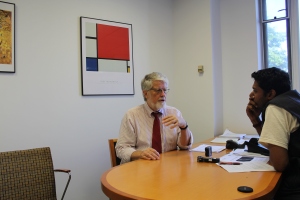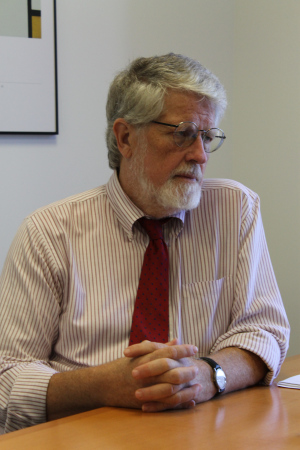By Balakrishnan Madhava
What follows is an interview with Richard Parker, a lecturer in public policy and senior fellow at the Shorenstein Center. A former economic advisor to Greek Prime Minister George Papandreou (2009-2011), Parker has worked as both a journalist and a philanthropist. His full biography can be found on the Harvard Kennedy School Web site.
Q: A year since the “Occupy” movement took hold, what has the influence been?
I think right now Occupy looks to most people like a moment rather than a movement. The unresolved question is whether it will return in a new moment as a durable movement.
I think that its utility was to elevate the issue of income and wealth distribution to the center of the debate about national politics. The way any movement works, what happens when it gets absorbed into the electoral process is it is reduced and, in many cases, actually sterilized. What we don’t know yet is what will result in terms of concrete policies because, so far, nothing really has.
The issue in part is because there are a sufficient number of voters supporting Republican Congressional candidates such that there isn’t even the possibility of using tax rates as a way to redistribute highly-concentrated income. In fact, Occupy itself was not intellectually clear about its strategy for addressing the inequality that it was pointing to.
In a sense it served one useful role, which movements do, which is to draw public attention sufficiently to an issue [such that] public and political elites begin to debate the issue. My own sorry and sad conclusion is that the quality of debates since Occupy brought the issue to the table has not been very elevated. It has been fragmented. It has been referenced or subordinated to the debate about where Dodd-Frank is going, to what the presidency of [Mitt] Romney or [Barack] Obama means for the Bush Tax Cuts and to an ongoing debate about the place of the deficit going forward in terms of politics at the national level.
Q: Do you think that this lack of articulation of tangible products was the fundamental difference with other movements that the country had witnessed?
I am of a generation that grew up in the middle of the Civil Rights Movement as the paradigm of movement politics. My first consciousness of the public sphere was of watching television or seeing newspaper or magazine photos of civil right workers being arrested or beaten up by police or of young black children trying to enter schools and being turned away. So, when you ask me about Occupy as a movement, the fundamental reference point of my generation will be the Civil Rights Movement.
Q: What’s the difference between the two movements?
One is that the Civil Rights Movement was an expression of the relation between groups that had a 300-year-old history to it. The movement towards greater equality had occurred in a crises moment in 1865 when slavery was abolished. And then there had been a little movement since that time because segregation had been put in place. The battle lines of that 1860s fight were still repressed battle lines in the 1960s, and so African-Americans could count on certain White allies whose grandfathers had fought in the Civil War over the issue of slavery and who themselves had a sense of bad conscience about segregation. So the Civil Rights Movement emerged over an issue that was painfully familiar to everyone in the country. This is not like income distribution. The issue of race has been present since the colonial period.

A second feature is the institution of the black church, which was absolutely critical in moving this forward. The black church could reach to elements of the white church, which then in turn had its own institutional framework for mobilizing constituencies. The church had established pastors as recognized and legitimate leaders. In many cases these were pastors [who] had been there for decades. They were known leaders, had been tested and assessed, and had supporters. They had a much more crystalline structure to turn to in terms of manpower, to mobilize support.
Occupy doesn’t have a similar network structure. It was acting in an ad-hoc way with ad-hoc leadership that was ambivalent about the idea of leadership. That is a bad combination.
Q: To deal with such a core problem, did Occupy require a different methodology to organizing?
The nature of what we call movements today is different than what they were even 50 or 100 years ago because of media and also social media. The way to think about this is that earlier you did not have instantaneous coverage of an event or a group that could itself represent coverage that is viewable by the world. You had human beings having to organize other human beings directly face-to-face in small groups, in defined geographic spaces and specific chronological order. The process of enlarging these groups depended on the quality of organizers working with those constituencies and other organizers working in similar ways in other geographical spaces, and then their coming together. But that was a very slow process that took years. It was impossible to think that you would get the demonstration turned out and three days later, it would be showcased on CNN International being viewed by people in 38 countries of the world.
My own view is that the speed, density and distance of coverage today actually cause these groups to be like fruit picked before they are ripe. These aren’t even movements yet; they are immature, infant, newborn movements and neither the leadership nor the groups as a whole have reached consensus based on a mutual ideological narrative and mutual trust and history. That means they are not going to have the strength to carry on; it looks good from distance on television (TV) but it can’t carry on its work.
Organizing since the 1950s has adapted to the presence of TV. Groups like Greenpeace in the 1980s were absolutely brilliant in leveraging a small number of activists to generate a large number of donors through the manipulation of the media. The actions by small numbers of disciplined activists were specifically geared not to achieve the stated goal but to draw attention via television of millions of others to the goal, so that the pressure of those millions of viewers contacting, say, a coal company or a Japanese whaling company or a nuclear power plant operator, represented the political force that was going to exert influence on changing that behavior. This was not a direct confrontation like classic labor-managerial conflicts at factories.
It was much more like a carom shot in a game of pool, where you hit the cue ball, which hits an object ball and then the ball gets hit. This is terrific but such events have a kind of half-life. You may generate a million donors but there are only 100 activists. What you are constantly thinking of is not deep education of the million supporters but the event that satisfies TV producers so that they will put us on television without us having to pay to advertise.
So, this creates a different kind of person called the “activist” and a logic for activism that is different from my early days, where we did not have any idea of the global scale of the audience. And that leads us to what I would call shallowness. It produces a kind of a lack of depth in the best sense, [both] among the organizers and among the organized.
Q: How can that depth be reimagined?
There are classic stages that movements go through that I know from my own experience in 1960s or the 1980s. So now you need to move to Occupy 2.0 or 3.0 even. You start to slough off some of the worship of anarchic non-authority. I have bad news for you. You are not durable against a system that is built entirely on authority and that has money, power and time on its side.
I think there needs to be some agreement that we are going to organize, we are going to have a structure and we are going to maintain minimum democratic limits on it in terms of election and recall. We are going to have to create a class of leaders who will reach decisions that we will be disciplined enough to follow in most cases; we will have a high threshold for disagreement.
Secondly, we must have a series of concrete proposals with some evidence of what the impact of those proposals is. It can’t just be repeal the Bush Tax cuts. On the front-end, there is an issue of how you can use the taxes and regulations to alter the flow of money into the various classes and on the back end, there is the role of labor unions, minimum wages or compensatory tariff among many other things. That’s just a short list. There is a set of complex issues.
I don’t want to turn Occupy Wall Street into Occupy Wall Street Policy Seminar 307 because that would be death for a movement, but the leaders of the movement have to be attentive, and move past the debate over one percent and 99 percent. I think there is a rich set of real proposals and the ones I mentioned are just half a dozen.
Q: Are you hopeful?
I am always hopeful. I am 65. I come from a tradition which says it is deeply important not to mourn but to organize. And I have lived through enough movements both in their success and failure; failure itself isn’t discouraging for me. The fact that one movement or one moment fails says nothing about the direction of history. The fundamental [idea] of it is that so often I see people wringing their hands when they have lost a tennis game. It is not the history of tennis. It’s not the tournament. It’s not even the match. We have just lost a game. So, brush the dirt off your knees, get up, dry your eyes, let’s pat each other on the back and get moving. I am sorry. I wish I could be more tragic!
